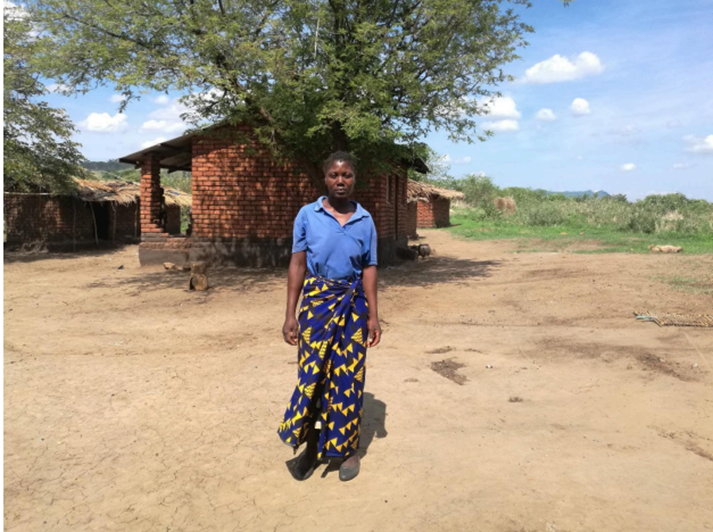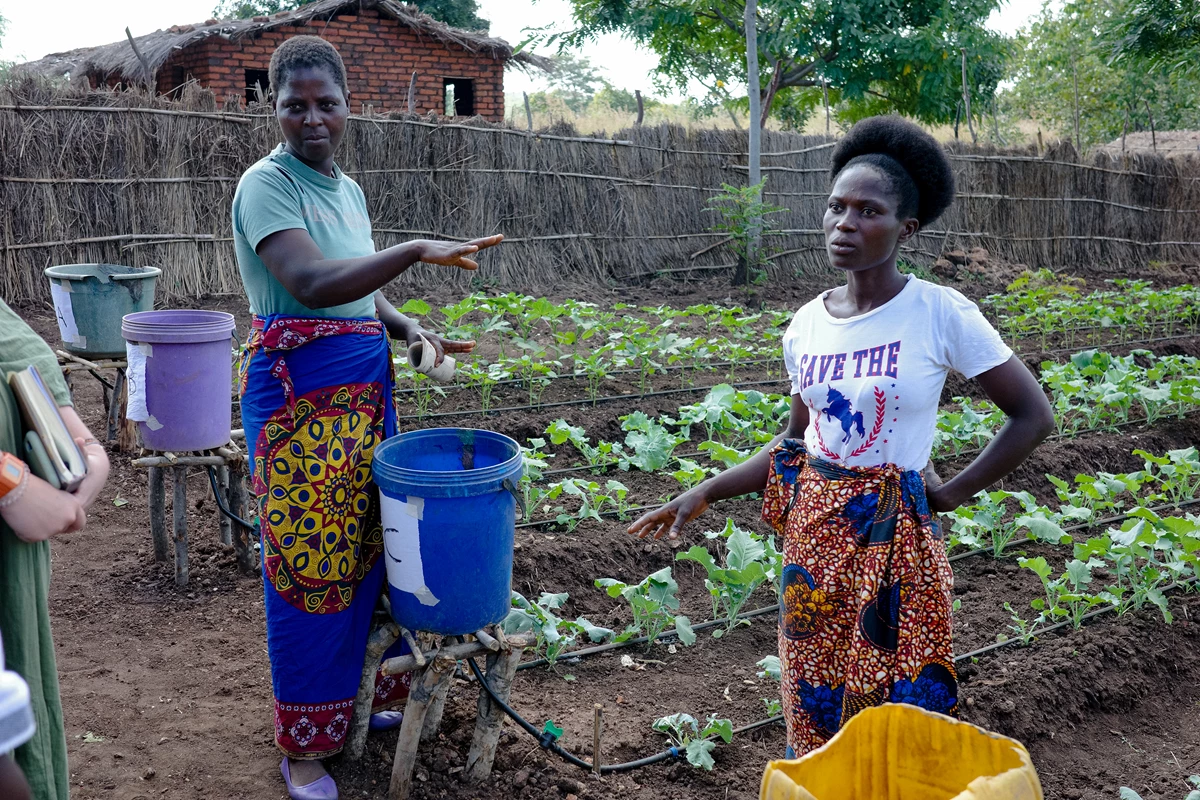CONSERVE: Conservation of Natural resources for Sustainable Economic Returns that Empower the vulnerable to find pathways out of poverty
Partner: Tearfund
2021-2025
Location: Traditional Authority Kambwiri in Salima District – around Thuma Forest Reserve and Kuti Wildlife Reserve – and Traditional Authority Chindi in Mzimba district – around Vwaza Marsh Wildlife Reserve – Malawi
Project partners:
Assemblies of God Care (AGCARE)
Synod of Livingstonia Development (SOLDEV)
Wildlife and Environmental Society of Malawi (WESM)
In collaboration with the Forest Research Institute of Malawi (FRIM) and the Malawi Plant Genetic Resource Centre (MPGRC)

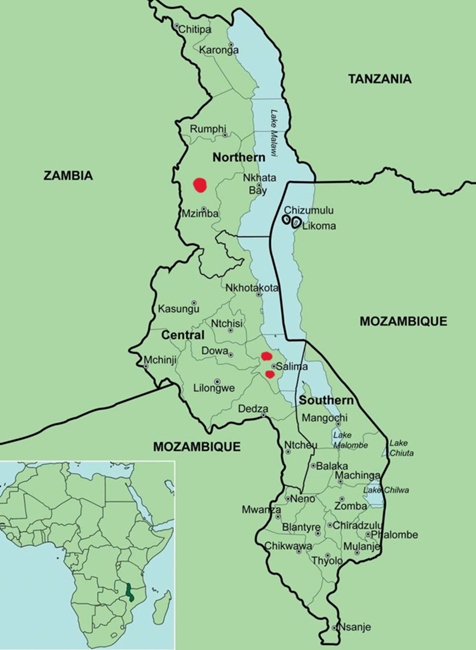
Scientific Figure on ResearchGate - Thuma, Kuti and Vwaza Reserves shown in red
Project aim
To enhance the wellbeing and resilience of 39,460 vulnerable people living on the fringes of the Vwaza Marsh Wildlife Reserve, the Thuma Forest and the Kuti Wildlife Reserve through improved conservation of the local ecosystems and biodiversity, and by the promotion of sustainable livelihoods.
Key facts and figures
Agricultural production and food security
- Over the course of the project period, maize yields rose from 710.3 to 891 kg/acre - an increase of 25%, while yields of groundnut and soybean more than doubled from 211.3 to 470kg/acre and 42.6 to 96 kg/acre, respectively.
- The number of people that have an acceptable Food Consumption Score (FCS) increased by 58%
- 190 community-based lead farmers trained to continue supporting fellow farmers with climate smart agriculture (CSA) to help build resilience to climate shocks.
- While the project originally set out to map 21 crop varieties, for conservation and restoration to enhance food security at household level, this target was exceeded by 18 – to a total of 39 species.
- The number of target farmers growing at least two or more main food/cash crops increased by 86%
Education and Awareness
- The project in Years 1-3 cumulatively reached out to 14,615 people with awareness information on the importance of biodiversity and ecosystem health, supporting the collection and conservation of 185 germplasm samples (crop seeds and seedlings) by community groups.
Reforestation
- 1,707,737 trees planted through establishment of tree nurseries.
- 540 hectares of land restored.
What was the problem the project set out to address?
The population of Malawi currently stands at 18 million and is projected to grow to 24.1million by 2025 . As a result, poverty and inequality remains high with the national poverty rate increasing from 50.7% in 2010 to 51.5% in 2016. Population growth has led to habitat loss, disruption of important, fragile and unprotected ecosystems, expansion of agriculture into marginal lands, increased demand for national resources such as wood and charcoal, overharvesting and exploitation of forest resources.
What did the project do to achieve this?
The project implemented multi-layered actions engaging communities, government and other key stakeholders living and present in the protected areas. Activities ranged from community members engaging in species mapping and developing their own plans for the sustainable use of natural resources and growing seedlings for the reforestation of degraded forest areas. Technical training was delivered to achieve increased agricultural productivity, benefitting not only household food security, but increasing income from crop sales. Community groups were established to support members to save, access loans to build businesses and access viable markets to sell their produce, while a goat pass-on scheme multiplied the amount of people benefitting from the distribution of livestock; almost doubling the amount of goats initially provided by the project.
Throughout the project life, engagement was facilitated with relevant Government of Malawi Ministries, enabling community members to advocate for amendments to the Wildlife Act and amplifying local voices in decision making around the management of National Parks and Wildlife Reserves.
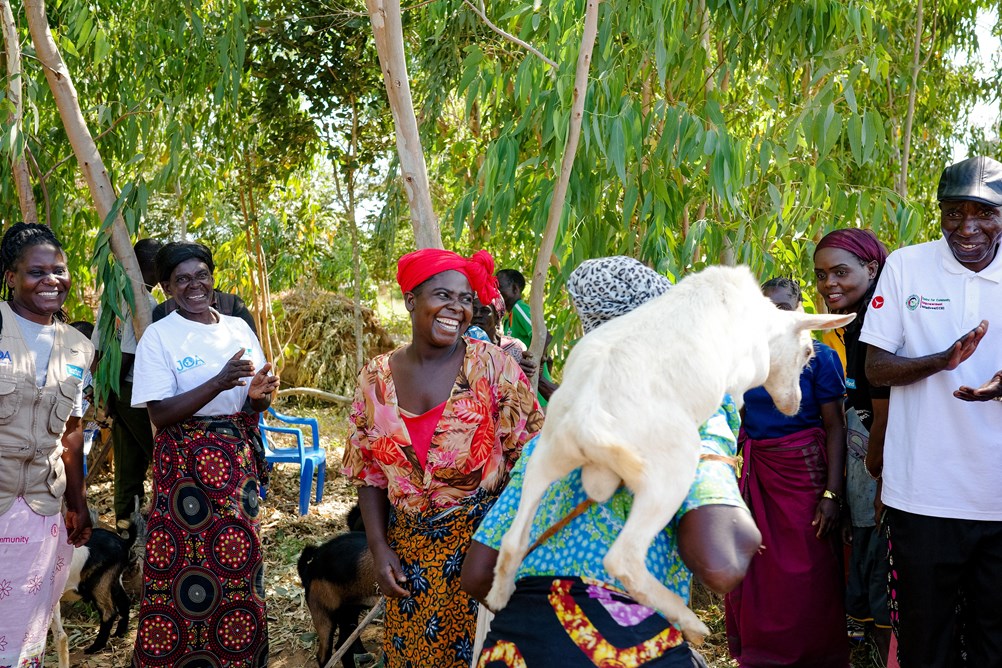
Goat pass-on scheme recipient demonstrating the goat she received through CONSERVE. Credit: Francesca Cleworth
Activities and Outcomes
Outcome 1
Inclusive and sustainable conservation of vulnerable ecosystem in protected areas by local communities, government and other key stakeholders.
The project supported communities to acquire and use fuel-efficient stoves, aiming to reduce firewood consumption and thereby contribute to tree conservation. The endline evaluation in Year 4 showed that the average household firewood use had decreased to 23.35 kg, surpassing the project target of 30 kg. This represents a significant 44% reduction compared to the baseline, positively impacting tree conservation efforts.
During Years 2, 3, and 4, the project supported communities to adopt sustainable livelihoods such as self-help groups, conservation agriculture, forestry-based enterprises (including beekeeping for honey production), and irrigation farming to improve incomes and food security. The endline evaluation in Year 4 showed that 65% of participants no longer used negative coping strategies, such as illegal harvesting of natural resources, poaching, and selling household assets.
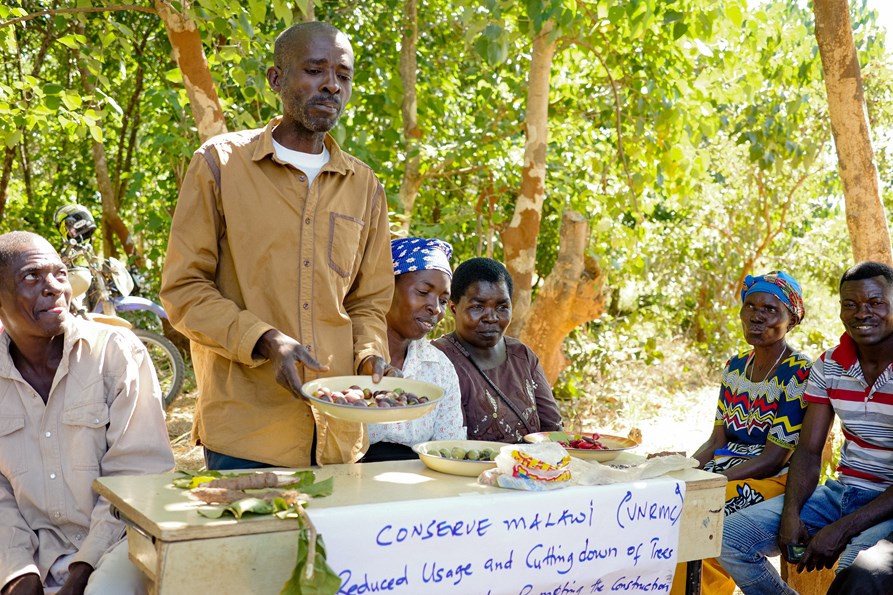
Village Natural Resource Management Committee (VNRMC) demonstrating collected Non-Timber Forest Products (NTFPs). Credit: Francesca Cleworth
Outcome 2
Improved food security and equitable livelihood opportunities contributing to poverty alleviation and human development.
The project focused on delivering important skills and training to participants on climate smart agriculture techniques, locally made fertiliser production, small-scale irrigation and post-harvest crop management. These new skills, alongside economic empowerment gained through Self Help Groups, substantially increased the crop yields of three main crops in the region, with the yields for maise increasing by 25%, groundnut 122% and soybeans increasing by 125%. These yield increases are extremely important in allowing these participants and their families to be more resistant to climate shocks impacting growing and harvest seasons, increasing household food security and income.
These yield increases are attributed to the wider adoption of the climate smart agricultural practices. This activity was designed with sustainability in mind; with 190 community-based lead farmers trained to continue supporting fellow farmers in collaboration with government extension services.
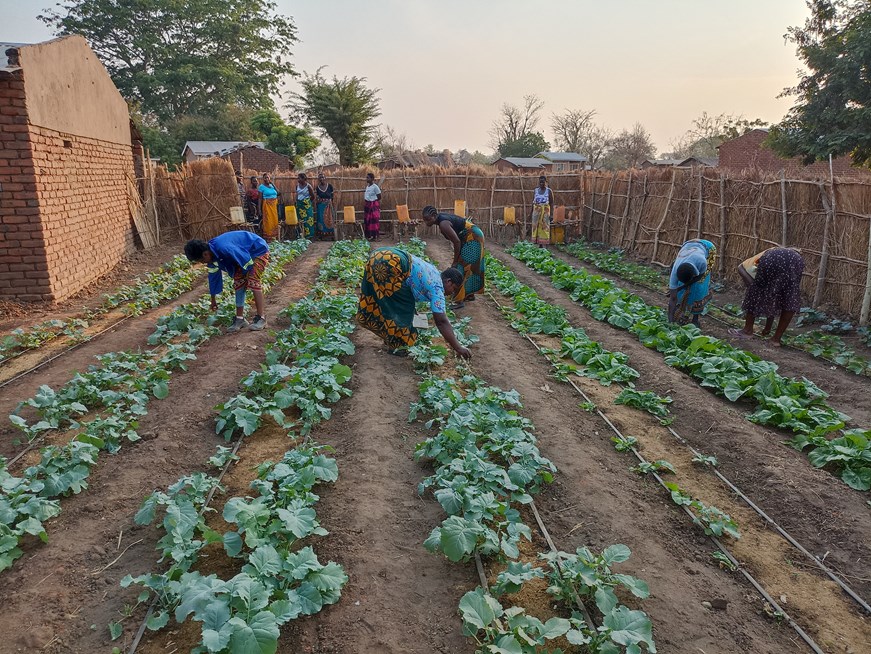
A community using irrigation drip system technology. Credit: Daves Ntoseni, Assemblies of God Care (AGCare)
Outcome 3
Strengthened collaboration among various stakeholders (NGOs, Conservation partners, Government, Communities) and capacity strengthening to bring sustainable change
The project successfully increased technical understanding among local partner staff and Government extension workers, contributing to a deepened understanding and awareness of the importance of biodiversity.
Furthermore, the project supported communities in the creation of 37 forestry management plans covering 58 Village Forest Areas across the two target districts. These plans included tree regeneration and the safeguarding of plant genetic diversity – both key biodiversity values aligned with the AICHI Biodiversity Targets. Additionally, the project supported the incorporation of two biodiversity values into the management plans, considered practical and relevant by communities to their local context.
Challenges
Over the course of the four-year project life, a variety of challenges were met with which required a proactive and flexible approach.
The 44% devaluation of the Malawi Kwacha in 2023 led to significant increases in the prices of essential commodities, including fuel and agricultural inputs (seeds and fertilisers).
Adaptive measures were applied to limit the effect of inflation on the project, with fuel procurement processes adjusted to secure a better purchasing rate and raining and engagement sessions clustered to the number of meetings while still achieving the intended outcomes.
Conflict between communities and wildlife, especially warthogs and wild pigs, continued to pose challenges – damaging crops and, in some instances, injuring people. This issue remains a key advocacy area, with calls to amend the Wildlife Act to include compensation provisions. The project also continued deploying game rangers to help drive animals back into protected reserve areas.
Lessons learned
Youth are powerful agents of change in conservation:
The involvement of school-aged children in wildlife and environmental clubs proved highly effective. Young people emerged as strong advocates for biodiversity, influencing attitudes and practices within their schools and wider communities.
Open and honest engagement is essential for resolving long-standing conflicts:
A notable example is the case of Kuti Wildlife Reserve, where historically poor relations between the management and surrounding communities contributed to the erosion of biodiversity. This situation was successfully addressed through open and transparent dialogue between management and community leaders, resulting in restored relationships and renewed collaboration.
Literacy enhances biodiversity conservation efforts:
The integration of adult literacy into REFLECT learning cycles contributed significantly to increased knowledge and awareness about biodiversity. Improved literacy levels helped participants enhance business activities and better understand the importance of conservation and engage more meaningfully in related activities.
Summary
The project’s impact on land restoration in Salima and Mzimba Districts has achieved an impressive degree of success. In the first year of the project, surveys showed that no land restoration had taken place. Effective community engagement during years 2-4 contributed to a significant uptake in conservation activities such as contour marker ridge construction, vetiver grass planting, tree planting, and natural regeneration – all contributing to water retention and improved soil health. This resulted in the restoration of 540 hectares of land, with 173 hectares being restored in year 4 alone, surpassing the initial programme target by 35%. This achievement has been largely contributed to by strong engagement with – and commitment by – participants to protect their natural environment and an increased understanding and awareness of biodiversity.
The effects of local currency instability have led to a sharp rise in the price of goods and services, causing the number of families living below the poverty line in Malawi to rise. Despite this significant challenge, endline results have shown that project participants were significantly more resilient to these issues, as their ability to meet their own food needs through their own production has been bolstered by project activities.
JOA is pleased to be funding a Phase II project, SU-CONSERVE, scaling these achievements to almost 9,000 new direct beneficiaries and expanding its reach to communities living around Malawi’s largest national park – Nyika. Backed by the same technically capable and locally rooted consortium, SU-CONSERVE aims to leverage deep local knowledge, strong stakeholder relationships, and a clear alignment with Malawi’s national biodiversity and development priorities.
“My parents forbade me from going to school, claiming that it would hinder my ability to assist my grandmother,”
“Some dishonest clients took advantage of my lack of counting skills and cheated me, in the process losing money through money changes,”
Msautsana was among 440 learners who joined the REFLECT Circles. Over six months, she committed herself to learning, determined to reclaim the opportunity denied to her in childhood. With her new skills, Msautsana has revived her small business with confidence, ensuring she can track her sales and avoid being defrauded. More than that, she has become a role model in her community. Once marginalised, she is now entrusted with leadership roles in both her local church and community groups. Her story is no longer one of deprivation but of determination, dignity, and development.
“I can now write, read, and count...It has changed everything for me.”
Msautsana Julia Mponda
